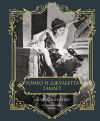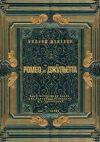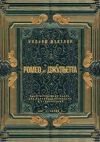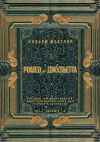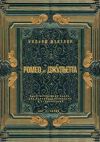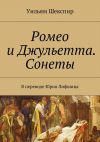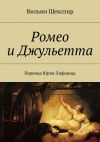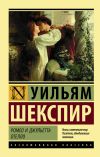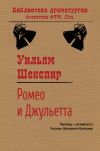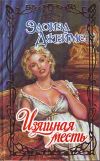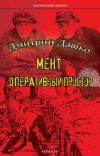Текст книги "Romeo and Juliet. Othello / Ромео и Джульетта. Отелло"

Автор книги: Уильям Шекспир
Жанр: Иностранные языки, Наука и Образование
Возрастные ограничения: +12
сообщить о неприемлемом содержимом
Текущая страница: 1 (всего у книги 5 страниц) [доступный отрывок для чтения: 1 страниц]
William Shakespeare / Уильям Шекспир
Romeo and Juliet. Othello / Ромео и Джульетта. Отелло
© Матвеев С.А., адаптация текста
© ООО «Издательство АСТ», 2020
Romeo and Juliet
Once upon a time there lived in Verona two great ancient families named the Montagues[1]1
the Montagues – Монтекки
[Закрыть] and the Capulets[2]2
the Capulets – Капулетти
[Закрыть]. Two households, both alike in dignity. They were both rich, and the city of Verona was divided by hatred. There was an old feud between them. Frequent fights took place between members of the two most powerful families, the Montagues and the Capulets. Even a servant of the house of the Capulets could not pass a servant of the house of the Montagues. Rude and unpleasant things, which they saying about each other, often ended in a fight. “The quarrel is between our masters and us their men.”
So street fights and duels were always growing out of these families. Moreover, frequent fights took place between them and the Prince of Verona[3]3
Prince of Verona – Герцог Веронский
[Закрыть], who ruled the city. But the Prince could do nothing to end the old dispute.
The son of Lord Montague was very unhappy because he was in love. He loved a nice girl called Rosaline[4]4
Rosaline – Розалина
[Закрыть], but his love gave him no joy, only dull pain and despair. His lady would not listen to his prayers and did not return his love. Young and passionate Romeo spent many sleepless nights thinking of his beloved Rosaline, but she continued to ignore him.
On a Sunday evening two of Capulet’s men were walking the streets of Verona. Suddenly they saw two servants wearing the livery of Montague coming towards them. They drew their swords and eyed each other, neither side quite daring to begin the fight until Capulet’s men saw Benvolio[5]5
Benvolio – Бенволио
[Закрыть] (Romeo’s cousin), one of their master’s kinsmen, approaching their way. So with a great show of boldness they began to attack. Benvolio sternly bade them put up their swords. But before he had ended this quarrel, Tybalt[6]6
Tybalt – Тибальт
[Закрыть], a young man of the house of Capulet, was behind him with rapier drawn. This Tybalt was a fiery soul, an eager duelist, and very skilful with his rapier. When Benvolio saw Tybalt, he asked him to be peaceful and help him to end the fray. But Tybalt sneered at him.
“What?” said he. “Talk of peace with your sword drawn? I hate the word peace as much as I hate hell, all Montagues, and you.”
Such insults were too much for Benvolio, and in a moment the fight began. At the sound of the fight the citizens came running out of their houses, eager to part them or to join in; and soon there was a fierce battle up and down the streets of Verona as more and more joined in on one side or the other. Even old Capulet, aroused by the cries, came out, with his wife following and trying to drag him back; and before long old Montague and his wife also were cheering on their own household: and abusing the Capulets.
Reports of the fray soon reached the Prince, who called for his horses and soldiers and galloped down to restore order. At the sight of the Prince the brawlers were suddenly quiet. They lowered their weapons and stood sullenly looking at each other. The Prince called Capulet and Montague before him, and spoke to them in anger.
“Three times,” he said, “you, Capulet, and you, Montague, disturbed the quiet of our streets with your brawls. If ever you disturb the peace again you will pay for it with your lives. “
He commanded Capulet to go with him, and all the rest to return peaceably back to their homes. When quiet was restored Montague asked Benvolio how the quarrel had started.
“Some of Capulet’s servants,” he replied, “were already fighting with some of yours as I approached. I drew my sword to part them, when Tybalt came at me; and so we fell to fighting, and more and more came out to join one side or the other, till the Prince himself came.”
“Where is my son Romeo?” asked Lady Montague. “I am glad he was not in this brawl.”
“Madam,” replied Benvolio, “an hour before sunrise Romeo rose and went walking by himself, sad and moody.”
“He would do this many mornings,” said Montague, “but when the sun is up back he goes to his chamber, locks the door, draws the curtains, and sits thus in darkness.”
“Do you know the cause of his sadness, uncle?” asked Benvolio.
“No,” said Montague, “though I have asked him and his friends; but he keeps his sorrows to himself so close and secretly that we can neither find the cause.”
At this they saw Romeo himself slowly coming towards them. So Montague and his wife, hoping that perhaps a young friend might succeed where parents had failed, went into the house, leaving Benvolio to speak with their son.
Benvolio soon discovered Romeo’s trouble: he was in love.
“Why, then,” said Benvolio, “forget to think of her.”
He was trying to persuade Romeo to forget Rosaline.
“Teach me how to forget,” answered Romeo pitifully.
“Look at other ladies,” said Benvolio. “Think about other faces.”
But Romeo refused. Benvolio was still trying to lift him out of his melancholy mood when a servant accosted them. He was carrying invitations to a grand party which his master was going to give.
“I pray you, sir,” said he to Romeo, “can you read anything you see?”
“Yes,” replied Romeo, “if I know the letters and the language.”
So the man handed Romeo a paper. It was a list of names, which Romeo read out for him.
“‘Signior Martino and his wife and daughters;
County Anselmo and his beauteous sisters;
The lady widow of Utruvio;
Signior Placentio and his lovely nieces;
Mercutio and his brother Valentine;
Mine uncle Capulet, his wife, and daughters;
My fair niece Rosaline and Livia;
Signior Valentio and his cousin Tybalt;
Lucio and the lively Helena’.
To what feast are these invited?” he asked
“To supper,” said the man.
“Where?” asked Romeo.
“To master’s house,” said the man. “My master is the great rich Capulet, and if you be not of the house of Montagues, I pray come and crush a cup of wine.”
But the man was indeed speaking with the only son of Montague himself.
“The fair Rosaline,” said Benvolio, “whom you love so, is going to this feast, with all the beauties of Verona. Go yourself; compare her face with some others that I’ll show you, and your lady will seem like a crow beside a swan. You’ll see many beautiful women there and then perhaps you’ll forget your Rosaline.”
Romeo would not believe it, but he consented to go:
“Oh no, I can never forget her, but I’ll go to that party because I’ll see my beloved Rosaline there!”
Meanwhile in old Capulet’s house all was bustle and excitement, and not only because of the feast. Capulet had only one child, a daughter called Juliet; and Count Paris[7]7
Count Paris – граф Парис
[Закрыть], a very suitable young nobleman, approached Capulet to ask that Juliet might be his wife.
“She is very young,” said Capulet, “she is not even fourteen; it will be time enough in two years. Wait.”
“Others at her age are married,” replied Paris.
“And too soon married,” said Capulet. “Tonight I hold a feast, and many of our Verona beauties will be there; you too will be most welcome.”
Paris accepted this invitation eagerly, and old Capulet went off to tell his news to his wife and to bid her prepare Juliet. So Lady Capulet sent Juliet’s old nurse to fetch her.
When Juliet came her mother began to talk to her, though the nurse, who was a very garrulous old woman, ever ready to tell some tale of Juliet as a baby, kept interrupting. At last Lady Capulet asked Juliet whether she had considered marriage.
“It is an honour, madam,” replied Juliet, “that I do not dream of[8]8
that I do not dream of – о которой я и не мечтаю
[Закрыть].”
“Well,” said her mother, “think of it now. To be brief. Count Paris seeks to woo you. You will see him tonight at our feast. Look at him carefully; for he would be a very worthy husband for you. Tell me, child, can you encourage Paris’s love?”
Juliet, who was quite taken by surprise, replied that she would indeed look carefully at Paris. There was no time to say more, for the first guests were arriving.
Romeo and Benvolio were already on their way. They met Mercutio and half a dozen others, and all wore masks. It was the Italian custom at such feasts for the dancers to disguise themselves. So with them was Romeo’s dear friend, Mercutio[9]9
Mercutio – Меркуцио
[Закрыть]. Mercutio was neither a Capulet nor a Montague, but a kinsman of the Prince himself, full of quips and jokes. As they went on through the streets of Verona, Mercutio began to joke with Romeo, but Romeo was too heavy-hearted for mirth. The feast was ended when they reached Capulet’s house, but the dancing was beginning, and they joined the crowd of guests. Old Capulet, not recognizing them in their masks, welcomed them heartily and brought them partners; but Romeo would not dance. He stood apart, moodily watching the scene. Suddenly he saw Juliet, and in a moment he forgot his former passion to Rosaline, because Juliet was very beautiful. Romeo stood gazing at her, for he was all in love with her.
“Who is the lady dancing with yonder knight?” he asked one of the servants.
“I do not know, sir,” the man answered.
Suddenly, however, a guest at the party, Tybalt, a nephew of Lady Capulet, recognized Romeo’s voice. He was furious with rage that a Montague dared to come to that party.
“Fetch me my rapier,” he said to his page.
Capulet noticed his fury and asked him its cause.
“Uncle,” he cried, “this is a Montague, our foe, who dares come here in that disguise to scorn our feast.”
“Is it young Romeo?” asked Capulet.
“Yes, the villain!” answered Tybalt.
“Let him alone,” said Capulet. “He bears himself like a noble gentleman, and all Verona speaks of him as very virtuous and worthy. I would not, for all the wealth of Verona, insult him in our house. Be patient and take no notice of him[10]10
take no notice of him – не замечай его
[Закрыть].”
But Tybalt was more furious than ever, and wanted to disobey his uncle. Old Capulet, however, was short tempered, and when he saw that Tybalt was still angry, he went on.
“It is my will. If you respect me, show a pleasant face, and cease this frowning; it is not suitable for a feast.”
Tybalt replied, “Such a villain is a guest! I’ll not endure him.”
“He’ll be endured,” said Capulet testily. “I say. Am I master here, or you? You’ll not endure him! You’ll make a riot among my guests!”
“Why, uncle,” replied Tybalt, “it is a shame.”
“Be quiet!” cried Capulet. “Or I’ll make you quiet![11]11
I’ll make you quiet – заставлю тебя замолчать
[Закрыть]”
Tybalt could not endure to be patient when he saw Romeo, so he strode away muttering vengeance when next they should meet.
Romeo had heard nothing of what passed between old Capulet and Tybalt. Unlike Tybalt, who wanted to fight, Romeo could think only of the beautiful Juliet. He made his way through the dancers and took Juliet’s hand and spoke to her and gently kissed it. They talked together for a while, but soon the nurse came to fetch Juliet away, for her mother wished to speak with her. Juliet was very attracted to the handsome young man.
“Who is her mother?” asked Romeo.
The nurse was surprised that one of the guests should ask such a question, and answered,
“Her mother is the lady of the house[12]12
lady of the house – хозяйка дома
[Закрыть], and a good lady too. I nursed her daughter, that you were talking with.”
When Romeo heard that his new love was a Capulet his heart sank; but he had no time for brooding, for the dancing was over and the guests were preparing to go home. As Romeo went out, Juliet asked her nurse who he was. She did not know, but asked one of the guests, and so learnt that it was Romeo, the only son of Montague.
On their way home Benvolio and Mercutio soon missed Romeo in the crowd of departing guests. And he made his way back to Capulet’s house, climbed the wall of the garden, and hid himself amongst the trees. He did not know that he was in Juliet’s garden.
The others stayed for some time calling for him, but as there was no answer they went home to bed. As soon as they bad gone Romeo came out of his hiding, and, in the darkness made his way towards the house, he saw a light in one of the upper windows. The window opened, and Juliet herself came out upon the balcony. She began to speak aloud. Romeo drew nearer and listened: Juliet, was murmuring his name.
At length Romeo, still hidden in the darkness, answered her. She asked him who he was.
“My name,” he replied, “is hateful to me because it is your enemy.”
Juliet at once knew his voice, and asked him, “Are you not Romeo and a Montague[13]13
a Montague – из рода Монтекки
[Закрыть]?”
“Neither,” he said, “if it displeases you.”
“Oh, Romeo, why are you called so? Renounce your father and give up your name!”
“If you swear that you love me I shall give myself a new name!”
“But how did you come here?” she asked. “The walls are high and hard to climb; and the place is death to you if any of my kinsmen find you.”
“Love’s wings,” said Romeo, “carried me here, for stone walls cannot keep out love.”
Then Juliet knew that he loved her as deeply as she loved him, and without any feigning or pretence she said,
“Do you love me? I know you will say ‘yes’.”
And each declared their love for the other, until the nurse from within the house called Juliet. Juliet answered that she was coming at once, but she said to Romeo,
“Three words, Romeo, and then good-night indeed. If your love is honourable, and your purpose marriage, send me word tomorrow by one that I shall send, where and what time you will marry me, and I will follow.”
The nurse called more insistently. So Juliet hurried inside, but soon she came back and again whispered:
“Hist, Romeo, hist!”
Romeo was still waiting, and answered her softly.
“At what time tomorrow shall I send to you?” she asked.
“By nine o’clock,” said he.
The first signs of dawn were now appearing in the east, which warned Romeo to be gone. He climbed over the wall, and instead of going home made his way towards the cell of Friar Laurence[14]14
Friar Laurence – отец Лоренцо
[Закрыть], his confessor.
The friar was up, as it was his custom to gather herbs to cure poor folk. He was thus busied when he saw Romeo approaching. He gave Romeo his blessing, and then asked why he was so early.
Then Romeo confessed that he was in love with Capulet’s daughter, and begged the friar to unite them in holy marriage.
Friar Laurence was astonished at this news, for a short while before Romeo had been in love with Rosaline, and now Rosaline was forgotten in this new love. At the same time the news was not unwelcome to him, for if the only son of Montague should marry the Capulet’s daughter then it seemed likely that the ancient rancour of these two houses might be buried.
In the morning, Benvolio and Mercutio came out into the streets of Verona to look for Romeo. Benvolio had no news of him. He had not been home since they parted, and a letter from Tybalt was waiting for him at his father’s house. When he heard this, Mercutio was afraid for his friend; for the letter must be a challenge. He knew that Romeo would accept this challenge; but Tybalt was an expert duellist, a most dangerous enemy.
Romeo approached. Mercutio treated him mockingly, as a forlorn lover, for as yet neither he nor any one knew that his hopeless love for Rosaline had given place to a warmer love for Juliet. But Romeo said nothing of his secret.
Juliet’s nurse came upon them, and asked whether they could direct her to Romeo. Mercutio and Benvolio thought she was vexed and indignant. But at last they left her to give her message to Romeo alone.
At first she forgot that she was to bring a message back from Romeo to Juliet. She was preparing to go away, but he stopped her. Then he bade her tell Juliet to come to confession to Friar Laurence’s cell that afternoon, and there they should be married. And further: within one hour his man should give her a ladder of rope by which he could climb up and visit Juliet.
The nurse was so excited at the thought of Juliet’s wedding that she began, as always, to chatter about the days when Juliet was a little girl, but at last she turned to go.
Juliet was waiting impatiently for the nurse to come back. It was nine when she had started, and it was noon before the old woman returned, out of breath, hot, weary, and peevish. Juliet at once asked her for her news, but she sat down to lament the aches in her bones. Juliet began to plead with her more urgently than before.
“Sweet nurse,” she said, “tell me what my love says.”
“Your love says,” began the nurse, “like an honest gentleman, and a courteous, and a kind, and a handsome – where’s your mother?”
“Where’s my mother?” repeated Juliet. “Why, in the house. What a strange message! ‘Your love says, like an honest gentleman, “Where’s your mother?”
“Are you so impatient?” snapped the nurse. “Is this a cure for my aching bones? Henceforward carry your own messages yourself.”
But she was soon mollified, and asked,
“Are you going to Friar Laurence today?”
“I am,” said Juliet.
“Then make haste to his cell. There’s a husband waiting for you there. Get you to the friar. I must fetch a ladder by which your love must climb up to the nest when it is dark. Make haste.”
When Juliet reached the friar’s cell, Friar Laurence and Romeo were waiting for her. Without more ado the friar led them to his chapel and then made them man and wife. And the friar gave them a solemn warning:
“Violent loves often have violent endings.”
So they parted.
Meanwhile two of Romeo’s friends, Benvolio and Mercutio, were walking in the street. It was a hot afternoon, and they sat down to rest. Soon they saw Tybalt with some of his friends. Tybalt came up to them. Tybalt was looking for Romeo.
“Gentlemen,” he said truculently, “a word with one of you.”
Mercutio was quite as eager, but Tybalt left him abruptly, for Romeo himself passed by, on his way back from the friar.
“Here comes my man,” cried Tybalt. He stepped up to Romeo and called him “villain”, which was as good as a challenge.
Romeo, his head full of thoughts of Juliet, answered him gently:
“I am no villain. Farewell. I see you do not know me.”
Romeo did not want to fight with Tybalt because he knew that Tybalt was Juliet’s cousin. But Tybalt challenged Romeo directly to draw his rapier and fight. Romeo replied even more gently than before. This unexpected meekness filled Mercutio with anger and amazement at such seeming cowardice. He was angry that Romeo did not return Tybalt’s insult. So he took the challenge himself and dared Tybalt to fight him. In a moment they were thrusting at each other.
Romeo called on Benvolio to separate them. He drew his own rapier and came between them. In this way Mercutio did not see Tybalt, and Tybalt thrust under Romeo’s outstretched arm and ran Mercutio through the body. Then he saw that the Prince’s kinsman is hurt, he turned and fled. Romeo at first thought the hurt but slight; but Mercutio knew that it was mortal, and, supported by Benvolio, he was led away into the nearest house.
Romeo himself stood dazed with horror at this sudden event, until Benvolio came out of the house to say that Mercutio was dead. Tybalt at this moment came back. Romeo drew his rapier and attacked Tybalt so furiously that, after a few passes, he ran him through the heart and he fell dead.
The noise of the fight had brought the citizens to their doors, and there was a great outcry. Benvolio urged Romeo to run and hide, for soon the Prince, old Capulet, Montague, and their wives and kinsfolk were on the scene.
The Prince demanded to know what had happened. Benvolio stepped forward and, while Lady Capulet loudly lamented over the body of her nephew Tybalt, told the Prince how Tybalt had first slain Mercutio and afterwards fallen before Romeo’s attack.
Then the Prince ordered Romeo to leave Verona immediately and never return. And Romeo will be banished! This hateful quarrel destroyed one of his own kin, and he showed no mercy.
It was now early evening. Juliet sat in her bedroom, watching the sun moving so slowly towards the west, and waiting impatiently for night and her beloved Romeo. Her thoughts of love were interrupted by the nurse, who came into the room wringing her hands and lamenting.
Juliet’s first question was to ask whether she had brought the ladder of cords. The nurse laid them down, but kept on weeping and moaning. Juliet asked her what was wrong.
“Ah,” she cried, “he’s dead, he’s dead, he’s dead! He’s gone, he’s killed, he’s dead!”
Juliet’s first thought was that Romeo had killed himself, and especially as the old woman went on, “O Romeo, Romeo, poor Romeo!”
Juliet demanded,
“If he is slain, say so; if not, say no.”
“I saw the wound,” lamented the nurse, “I saw it with my own eyes, here on his breast. O Tybalt, Tybalt, the best friend I had.”
This made Juliet more bewildered to know who was dead, whether Romeo or Tybalt. At last the nurse said clearly,
“Tybalt is gone and Romeo banished; Romeo that killed him.”
“O God!” cried Juliet in horror, for she loved her hot-tempered cousin dearly. “Did Romeo kill Tybalt?”
“He did, he did,” moaned the nurse.
Tybalt’s death was bitter to Juliet, but Romeo’s banishment bitterer. The old nurse was touched by Juliet’s grief.
“You go to your chamber,” she said, “I’ll find your Romeo to comfort you. I know where he is; he is hidden at Friar Laurence’s cell. He’ll be with you tonight.”
At these words Juliet dried her eyes and gave the nurse a ring to give Romeo.
Meanwhile Romeo was hiding in the friar’s cell. The friar went into the city and there learned the Prince’s sentence[15]15
Prince’s sentence – приговор Герцога
[Закрыть]. When Romeo heard that he was banished, he flung himself on the ground in wild, unrestrained grief. The friar tried to comfort him. He listened to no reasons but continued to sob and groan, and he was still in this state when the nurse arrived at the cell.
She urged him to go to Juliet. At the sound of her name he rose and asked where she was.
Then the friar bade him go to Juliet secretly, as had been planned, but to steal away from Verona in the morning before it was too late. Thence he must fly to Mantua until his friends could publish the marriage and win his pardon from the Prince. Meanwhile the nurse must go back to the house and persuade all to go to bed. So the nurse gave Romeo Juliet’s ring and hurried away. After a while Romeo bade farewell to the friar, made his way into Verona, and climbed into Capulet’s orchard. The ladder of cords was ready for him. He mounted silently.
It was now very late; but neither old Capulet nor his wife was in bed. The old man was greatly grieved at the events of the day, not only for himself but for Juliet’s sake. He knew that she loved her cousin Tybalt dearly, and he tried to distract her sorrow. He sent for Count Paris. He knew that a young nobleman Paris wanted to marry Juliet. And if they marry, Juliet will forget the death of her cousin and find happiness again. Though there was no time for Paris to talk to Juliet. Therefore, he explained, he wanted to wed them as soon as possible: Wednesday maybe, or, if that was too soon, let it be Thursday. So they agreed. Capulet asked his wife to tell Juliet to be ready for her wedding. He called for lights and went up to bed.
Juliet did not know about her father’s plans. When Romeo visited her secretly that night in her room, they spoke only of their love and of Romeo’s departure.
There was a gentle knock at the door. It was the old nurse come to warn the lovers that Lady Capulet was on the way. Juliet opened the window. Romeo gave her one kiss and then began to climb down; and so sadly they parted.
When Lady Capulet came into the room she found Juliet in tears. She supposed the tears were caused by Tybalt’s death, and that Romeo, his murderer, escaped. Then Lady Capulet said that she came to bring good news.
“Well, child,” said Lady Capulet, “your careful father prepared an unexpected day of joy for you.”
“What day is that?” asked Juliet.
“Next Thursday,” went on her mother, “the gallant young nobleman Count Paris at St. Peter’s Church will make you his bride.”
Juliet jumped up in horror and anger.
“No! I wonder at this haste. Please tell my father that I will not marry yet; and when I do, it will be Romeo, rather than Paris.”
Lady Capulet was disgusted.
“Here comes your father,” she said. “Tell him everything.”
Old Capulet came into the room, expecting to find Juliet happy and excited; but he saw her new tears. Turning to Lady Capulet, he asked,
“Did you tell her our decision?”
“Yes,” answered Lady Capulet peevishly, “and she refuses.”
“What!” said Capulet. “What! She refuses! She will not marry! Does she not thank us? Is she not proud? We have persuaded so worthy a gentleman to be her bridegroom!”
When Juliet tried to talk to her father, he entirely lost his temper and shouted at her. She must get herself ready to be married on Thursday or he will drag her to church on a hurdle. He was very violent in his rage. If she does not marry he will throw her out of his house and let her starve! And he will never acknowledge her as his daughter! With that he flung out of the room. Lady Capulet was disgusted that after all their trouble her daughter rejected Paris so lightly.
Juliet begged nurse for comfort and advice. But the nurse had little to give her. Romeo was banished and never dared come back. Juliet must marry the count – he was a lovely gentleman, that was her nurse’s advice. So Juliet saw that no one wanted to help her. Maybe the friar? She asked the nurse to tell her mother that she was going to Friar Laurence.
When Juliet reached the friar’s cell, Count Paris was there. He came to summon Friar Laurence to make the marriage between Juliet and himself. The friar was greatly troubled at this hasty decision, yet he dared not refuse Paris. Paris made her gallant speeches, but she put him off and went in to make her confession to the friar. The friar thought for a while and told her a desperate plan.
He asked Juliet if she could face death to be with Romeo. Of course she will do anything, however violent or horrible! So the friar gave her a little bottle and said:
“Go home. Consent to marry Paris. Tomorrow is Wednesday. Tomorrow night, when you are in bed, take this phial and drink off the contents, and at once a coldness will run through your limbs. Your pulse will cease; your cheek will grow pale; and in this state you will remain for forty-two hours; and then you will awake as from a pleasant sleep. Now, when the bridegroom comes to rouse you in the morning, they will think that you are dead. Then, after the custom, you will be dressed in your best robes and carried to burial in the ancient family tomb. In the meantime, my letter to Romeo will tell him what happened. He will rush to the tomb and when you awake from your sleep, the two of you can escape to Mantua[16]16
Mantua – Мантуя (город в итальянской провинции Ломбардия)
[Закрыть].”
With the friar’s blessing and a prayer, Juliet left him. When she reached home, old Capulet was bustling the servants to get ready for the wedding feast.
“Where were you?” asked her father.
“I met Friar Laurence, and I changed my mind. I’ll do what you suggest”, answered Juliet. And she knelt for her father’s blessing.
Capulet was pleased by this change. He prepared the wedding for the next morning. Off he went himself to tell Count Paris.
Juliet meanwhile went up to her chamber with the nurse to prepare her best dress for the wedding. Then she told the nurse to leave her.
As soon as she was alone she took out the phial and looked at it. She was afraid. Was it poison? Will she really die? No! The friar is a holy man and can not deceive her.
“Romeo, Romeo,” she cried, “I drink to thee!”
So she drank the potion, and almost at once she fell senseless upon her bed.
The next morning Capulet told the nurse to go in and wake Juliet. The nurse went up to the chamber and drew the curtains. Then she went towards Juliet and saw that she was lying on the bed, dressed in all her clothes. But Juliet did not answer. The nurse shook Juliet; she was stiff and cold. The nurse ran out. She was screaming that Juliet was dead.
Capulet and his wife rushed to the bedroom. They looked at her, and felt that she was indeed cold. Their rejoicing was turned in a moment to lamentation, and the wedding guests went sadly home, to prepare for the funeral.
That time Romeo was in Mantua and was waiting anxiously for a letter from Friar Laurence; but it did not come. At last his man rode up to Romeo’s lodgings from Verona. Romeo eagerly asked him for news of Juliet. The man heard of Juliet’s death on her wedding-day. They were carrying her to the tomb.
Unfortunately Romeo heard this tragic news before the friar’s letter. Romeo at once asked the man to ride back to Verona that night. Then he went to a poor apothecary. He knocked at the door. The man came out timidly. Romeo demanded a poison, very swift in its effects. The apothecary was frightened at his request, but Romeo insisted. And at the sight of gold, forty ducats in gold, the apothecary brought out his powder, thrust it hurriedly into Romeo’s hands, and shut the door upon him.
As night fell Romeo left Mantua, took his man with him, and rode back towards Verona.
Meanwhile Friar Laurence was anxiously expecting an answer from Romeo to the letter which he sent by his friend, Friar John. Friar John came back to the cell, but not with a message from Romeo. As he was going, he said, to find a priest to accompany him to Mantua, the searchers of the city came upon them, and shut them in and did not want to release them. They suspected the friar visited a house infected by the pestilence. So the letter miscarried.
“Who then took my letter to Romeo?” demanded the friar.
“I could not send it,” replied Friar John, “so I have brought it back to you.”
Then Friar Laurence was very frightened, for he knew Romeo’s desperate nature. He bade Friar John procure an iron crowbar; and with that he hurried away to the vault.
But another was already at the tomb. Count Paris was strewing flowers before the door of the vault and softly lamenting his dead bride. After a while his page warned him that he heard footsteps in the darkness. They stepped back and hid themselves. Someone was approaching with a torch. It was Romeo and his man, carrying a mattock and a crowbar. Romeo commanded his servant to leave him, and in the morning deliver a letter, which he gave him, to his father Montague. Then with the crowbar he began to open the door of the vault.
When Paris saw that it was Romeo, a Montague, opening the Capulet tomb by force, he thought that Romeo came to commit some vile shame on the dead. Paris drew his sword and came nearer. Romeo in desperation also drew his sword to defend himself against his assailant, for in the darkness he did not know that it was Paris. So they fought, and Paris’s page ran away to call the watch.
Внимание! Это не конец книги.
Если начало книги вам понравилось, то полную версию можно приобрести у нашего партнёра - распространителя легального контента. Поддержите автора!